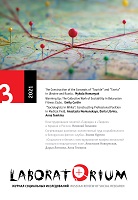Social Theater in the Crisis Time in Ukraine: A Sociological Perspective (on the Basis of Data from Kharkiv)
Social Theater in the Crisis Time in Ukraine: A Sociological Perspective (on the Basis of Data from Kharkiv)
Author(s): Yuliya Soroka, Anna SavchenkoSubject(s): Theatre, Dance, Performing Arts, Regional Geography, Sociology, Culture and social structure , Social development, Radical sociology , Pedagogy
Published by: Центр независимых социологических исследований (ЦНСИ)
Keywords: Social Theater; Forum Theater; Playback; Verbatim; Emancipation; Empowerment;
Summary/Abstract: A variety of interactive theater techniques is widely used in work with marginalized groups, in social work, social pedagogy, and psychotherapy. The crisis in Ukraine, spawned by the abuse of power that led to the Euromaidan protests, the annexation of the Crimea, and military operations in Donbas, contributed to the growing popularity of social theater as a form of social activism. Social theater is characterized by the direct connection between a creative product and real-life events, the involvement of amateur performers, creation of plays based on the testimonies of real people, encouragement of the audience participation in the performance, financial independence, and the non-profit status. Social theater is conceptualized through the distinction with traditional theater and identified with documentary drama. Unlike political theater, which focuses on criticizing the political system, social theater focuses on social contradictions and inequalities. This also distinguishes social theater from art therapy, where an individual is the object of influence. In sociology social theater is viewed from the perspective of social transformations. To analyze such processes of social transformation at the micro level, the article uses the concepts of emancipation and empowerment. The empirical basis of the article consists of interviews with participants of the forum theater and playback theater, conducted in Kharkiv in 2018. Kharkiv’s borders with both the Russian Federation and the territories that are not controlled by the Ukrainian government make it unique compared to other Ukrainian cities where social theater groups operate. In 2014 Kharkiv managed to avoid the fate of Donetsk and Luhans’k, which were occupied by separatists. In contrast to the complex structure of the local frontier identity, Kharkiv authorities traditionally attempt to impose strict control on public space, suppressing alternative views. The data presented in this article addresses the following questions: what topics performances of social theater in Kharkiv covered during the period under study, how individual transformations of participants take place in the emancipatory space of social theater, and how the distinctive features of social theater turn it into a place of empowerment.
Journal: Laboratorium. Журнал социальных исследований
- Issue Year: 13/2021
- Issue No: 3
- Page Range: 111-133
- Page Count: 23
- Language: English

